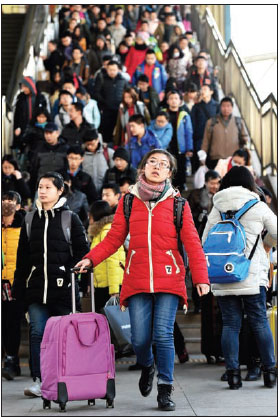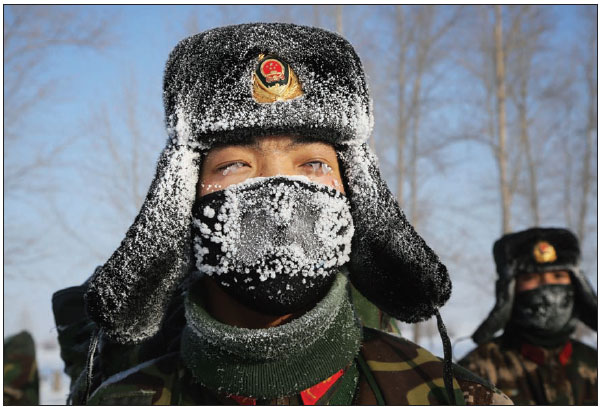News in review
Updated: 2016-01-29 11:44
(China Daily USA)
|
|||||||||
Monday January 25
Patient responds to new liver treatment
Chinese scientists have developed a bioartificial liver system that can prolong the survival of pigs with acute liver failure, indicating a promising clinical application for humans facing a comparable life-threatening illness.
In the first human application of the device, a woman in her 60s who has had hepatitis B for more than four decades and was recently diagnosed with liver failure received the treatment earlier this month.
'After using the bioartificial liver device, her liver function recovered well and she is no longer critical,' said Hui Lijian, head of a group of scientists at the Institute of Biochemistry and Cell Biology.
Steel production to be cut by 100 to 150 million tons
Chinese Premier Li Keqiang has reiterated the urgency and the government's resolve to cut excess capacity in steel and coal industries, as the country strives to restructure its economy.
'China will cut crude steel production capacity by 100 to 150 million tons,' according to a statement issued on Sunday after an executive meeting of the State Council chaired by Li.
The State Council didn't specify the deadline for such a cut, but pointed out that China has reduced its production capacity of crude steel by more than 90 million tons in recent years. China will reduce the production capacity of coal by 'a relatively large margin,' according to the statement.
'Digesting overcapacity in steel and coal sectors is an important measure to promote the supply-side structural reforms,' the statement said, adding that the process will deliver the industries out of trouble and achieve upgrading.
China's production of crude steel fell 2.3 percent to 804 million tons in 2015, the first time the industry reported negative growth in 34 years. (Photo 3)
Tuesday January 26
Thousands of prisoners released in amnesty deal
A total of 31,527 prisoners, most of whom were juveniles when they committed crimes, have been released under an amnesty agreement, officials said.
The agreement, decided on last year by the top legislature and signed by President Xi Jinping, was adopted to mark the 70th anniversary of the end of World War II.
Among those released were those who fought in the War of Resistance Against Japanese Aggression (1937-1945) and the Chinese civil war in the 1930s and 1940s. They are at least 80 years old.
The majority of those released - 29,927 - committed crimes when they were under 18 and were sentenced to less than three years in prison.
Chinese researchers have successfully created autistic monkeys by implanting autism-related genes into monkey embryos.
The monkeys are the world's first nonhuman primates to show the effects of autism and will play an important role in studying the pathology of the condition and exploring effective intervention and treatment, researchers said.
The research has demonstrated the feasibility of studying brain disorders with genetically engineered primates, according to neuroscientist Muming Poo, a foreign member of the Chinese Academy of Sciences, who is also a member of the National Academy of Sciences in the United States.
Patients with autism spectrum disorder usually exhibit defects in social interaction, stereotyped repetitive behaviors, anxiety and emotional difficulties.
Wednesday January 27
Mobile phone users exceed 1.3 billion
China's mobile phone users exceeded 1.3 billion by the end of last year. Nearly everyone in the country owns a mobile phone, and 29.6 percent of them are 4G users, according to the latest data from the Ministry of Industry and Information Technology.
In 2015, new 4G subscribes increased by 289 million, nearly tripling that of 2014, which brought the total number to 386 million by the end of last year.
Meanwhile, the number of 2G users fell sharply - 183 million less than a year earlier. The number accounted for 39.9 percent by 2015, according to the ministry.
Subscribers of fixed telephone lines stood at 231 million, decreasing by 18.4 million during the same period. (Photo 4)
Hong Kong hits all-time low on happiness index
Hong Kong people are less happy compared with peers in Osaka, Japan, and Seoul. Housing-related problems, a slowing economy and political bickering are dragging ratings down, according to a City University of Hong Kong poll.
Among the three cities, Hong Kongers had the lowest overall happiness rating, ranking 6.83 out of 10 while Seoul scored 7.01 and Osaka 7.41.
Hong Kong's score dipped by 0.15 against last year's result of 6.98, breaking the 7 threshold for the first time since the survey began in 2002. Even when the city was stricken by the Severe Acute Respiratory Syndrome outbreak in 2003 the index was 7.11.
Dissatisfaction with politics and society came in at 4.33 while environmental rankings stood at 4.8 and housing at 4.05, a record low in the Happiness Index survey.
Thursday January 28
AIIB president says China won't use veto
China has no intention of exercising its veto power over the newly established 57-member Asian Infrastructure Investment Bank (AIIB), according to the lender's president.
This is despite that the country has this right because of its economic size, Jin Liqun said.
'There are still many countries on the waiting list, and when the new members join, China's voting power will be reduced. Such de facto veto power will be lost gradually,' Jin said.
He made his comments to China Daily at the annual meeting of the World Economic Forum in Davos last week.
Members of the AIIB, which has been set up after two years of negotiations, have agreed on a crucial decision-making process by introducing a 'fixed' special majority, comprising two-thirds of the number of members and representing three-quarters of the voting power.
China, the largest AIIB shareholder, holds 26.6 percent of the voting power, Jin said. 'We will not increase the special majority to keep China's veto power in the future,' he said. (Photo 5)
Beijing will cut the level of PM2.5 in the air by 5 percent this year, and will allocate more funds for projects to reduce emissions, an environmental official said.
To achieve the goal, the capital will inject 16.5 billion yuan ($2.5 billion) into projects to reduce air pollution in 2016, up from 5.9 billion yuan in 2015, said Yu Jianhua of the Beijing Municipal Environmental Protection Bureau. PM2.5 are particles smaller than 2.5 microns that can damage lungs.
Friday January 29
Oil imports surged more than 60% on low prices
The country's reliance on imported oil soared by more than 60 percent last year, amid tumbling oil prices and steadily-growing domestic energy demand, a new report said.
China imported 328 million tons of oil, up 6.4 percent, accounting for 60.6 percent of China's total oil consumption in 2015. Oil consumption rose 4.4 percent to 534 million tons during thesame period, said a report released by the Economics & Technology Research Institute ofChina National Petroleum Corporation.
According to the report, reliance on foreign crude will increase to 62 percent this year with total imports estimated at about 357 million tons. Crude demand will rise by 4.3 percent to 566 million tons during the same period.
M&A activity hit record high in 2015
Mergers and acquisitions hit a record high level in China last year, rising 37 percent year-on-year, according to a new report.
Global auditing firm PricewaterhouseCoopers said 9,420 deals were completed during 2015,worth $733.7 billion, which marked an 84 percent increase in value.
The latest figures show the number of domestic strategic M&As grew strongly, driven by the ongoing economic transformation,sector consolidation, restructuring and bold inorganic growth strategies.
Outbound activity also grew 40 percent by volume and 21 percent by value, both new highs.
The private sector led the charge, but financial buyers and private equity investors were also very active, as State-owned enterprises remained largely subdued.
'In 2015 we saw a continuation of the outbound trend, with strategic buyers pursuing inorganic growth strategies and seeking technologies and brands to bring back to the China market,' said George Lu, PwC China's transaction services partner.

|
Passengers going home for the Spring Festival enter the Taiyuan railway station in North China's Shanxi province on Sunday. The Chinese Lunar New Year begins on Feb 8 and marks the start of the Year of the Monkey, according to the Chinese zodiac. Xinhua |
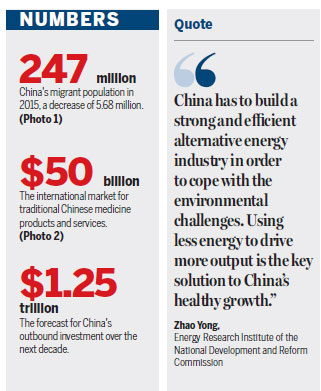
|
|
(China Daily USA 01/29/2016 page12)
- Students must learn safety education, experts say
- 73 bodies recovered from rubble of Shenzhen landslide
- Chinese travelers lead 2015 global outbound tourism
- S Korea to issue 10-year visa to highly-educated Chinese tourists
- A glimpse of Spring Rush: little migrant birds on the way home
- Policy puts focus on genuine artistic students
- Goodwill sets tone at Wang, Kerry's briefing
- Obama picks new Afghan commander
- Ceremony held in Auschwitz Camp to remember the Holocaust
- Thousands of beckoning cat on display in Japan's Goutoku Temple
- Chinese fishing boat capsizes off S. Korean island: Yonhap
- 42 cases of Zika infection reported in N.E. Panama

 Top 10 best selling cars on Chinese mainland 2015
Top 10 best selling cars on Chinese mainland 2015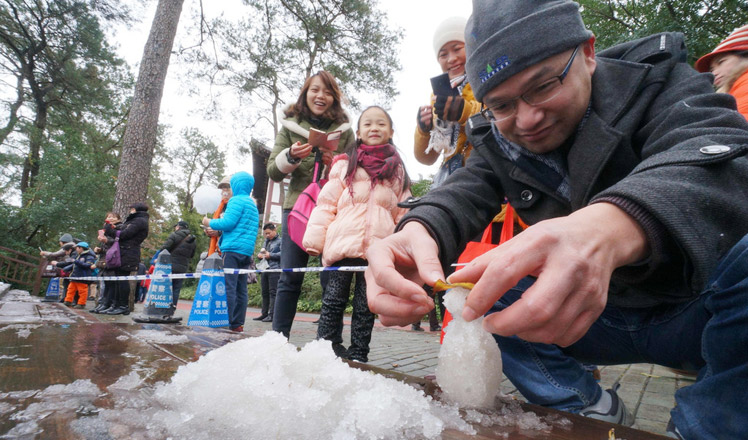
 Warm memories in the cold winter
Warm memories in the cold winter
 The world's highest library
The world's highest library
 In-flight meal prepared for travel rush ahead of Spring Festival
In-flight meal prepared for travel rush ahead of Spring Festival
 72-year-old teaches yoga for free in Hangzhou
72-year-old teaches yoga for free in Hangzhou
 Sea ice traps boats as cold wave sweeps across East China
Sea ice traps boats as cold wave sweeps across East China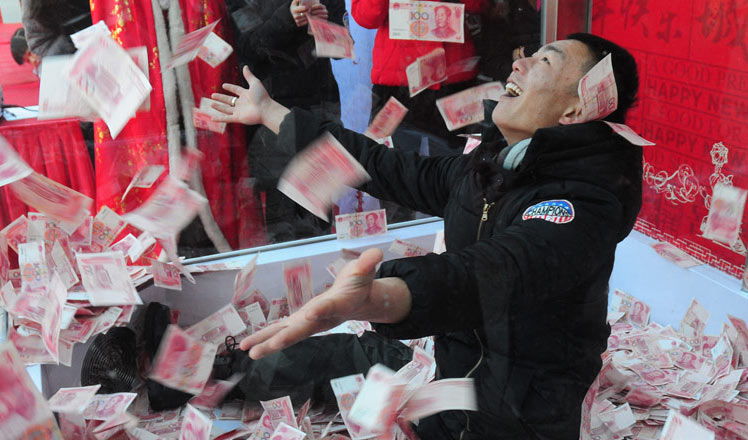
 10 tourists grab free money in one minute in East China
10 tourists grab free money in one minute in East China
 Warm colors at sunrise cast off the chill in Qingdao
Warm colors at sunrise cast off the chill in Qingdao
Most Viewed
Editor's Picks

|

|

|

|

|

|
Today's Top News
National Art Museum showing 400 puppets in new exhibition
Finest Chinese porcelains expected to fetch over $28 million
Monkey portraits by Chinese ink painting masters
Beijing's movie fans in for new experience
Obama to deliver final State of the Union speech
Shooting rampage at US social services agency leaves 14 dead
Chinese bargain hunters are changing the retail game
Chinese president arrives in Turkey for G20 summit
US Weekly

|

|
